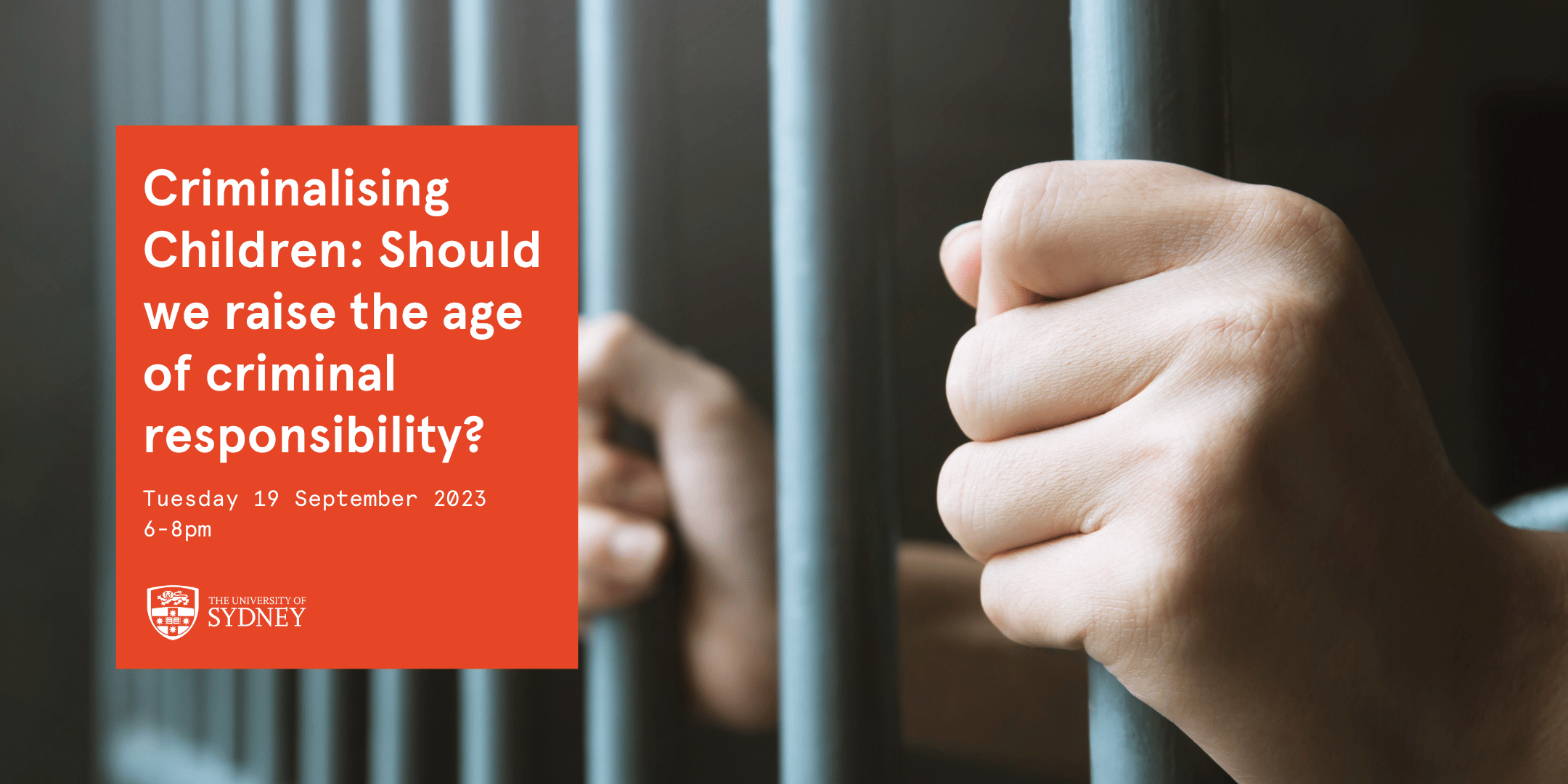
Criminalising Children: Should we raise the age of criminal responsibility?
Criminalising Children: Should we raise the age of criminal responsibility?
In-person event
Recently, the Northern Territory became the first Australian jurisdiction to raise the minimum age of criminal responsibility from 10 to 12 years. In New South Wales, and other Australian jurisdictions, the minimum age remains 10, which is one of the lowest minimum ages of criminal responsibility in the world. That is, while a child under the age of 10 cannot be convicted of a criminal offence, and while a child aged between 10 and 14 is likewise presumed to be doli incapax, this presumption can be rebutted by the prosecution on the evidence.
But is the age of 10 too young to criminalise any child? What harms accrue to incarcerated children?
There are many arguments in favour of ‘raising the age’ to minimise the criminalisation of children. First, there is the alarming over-representation of Indigenous children in detention. Second, raising the age of criminal responsibility would recognise the fact that children are in a period of neurodevelopmental immaturity. Third, the younger a child is when first encountering the criminal justice system, the more likely they are to re-offend as an adult. Fourth, the great prevalence of mental health disorders and cognitive disabilities amongst young people in the criminal justice system, compared with the general youth population, highlights a vulnerability that would be better addressed outside the criminal justice system. Finally, incarcerated children are deprived of the family, friends, education, health, cultural and sporting opportunities that most of us take for granted.
Given the significant momentum for raising the age of criminal responsibility following the Northern Territory’s decision, this panel will examine whether other Australian jurisdictions should do the same – or raise the age even higher.
About the panel discussion
To continue the dialogue around raising the age of criminal responsibility, the Sydney Institute of Criminology is hosting a panel of academics and legal professionals.
Introductions: Dr Carolyn McKay (Co-Director, Sydney Institute of Criminology)
Chairperson: Professor Megan Williams (Principal of Yulang Indigenous Evaluation)
Professor Megan Williams is Wiradjuri through paternal family and has worked for over two decades advocating for the use of Aboriginal and Torres Strait Islander people’s expertise in health service design and evaluation, research, ethics and university curriculum. Megan is principal of Yulang Indigenous Evaluation and worked in the tertiary sector across three decades, most recently at UTS. Megan is author of the Ngaa-bi-nya Aboriginal evaluation framework available at the Evaluation Journal of Australasia, contributed as background work for the Australian Government’s Indigenous Evaluation Strategy. Megan collaborates on ARC, MRFF, NHMRC, government and industry funds for research, and has had local and national roles including as a Human Research Ethics Committee chairperson, and Health Sociology Review associate editor including for the Yuwinbir Special Issue. Megan is a member of the AIHW National Prisoner Health Information Committee and Corrective Services NSW Aboriginal Advisory Council. Megan has been miimi (sister) of Mibbinbah community organisation for 15 years, and is Chairperson of independent media company Croakey.org.
Panellists
- Dr Krystal Lockwood (Lecturer, Griffith Criminology Institute, Griffith University)
Dr Krystal Lockwood is Gumbaynggirr and Dunghutti, and grew up in Armidale, New South Wales. She is an applied justice researcher, with methodological expertise in qualitative, realist, and Indigenous research and evaluation, as well as experience with quantitative methods. Broadly, her research examines how programs, policies, and practices are used to address complex problems. Her research interests include parental incarceration, reintegration, and sentencing processes; application of realist and Indigenous methodologies; and the impact of the criminal justice system on social justice outcomes, particularly for Indigenous peoples. Krystal is also interested in the application of Indigenous knowledges and perspectives in tertiary education and the justice sector.
- Mr Robert Hoyles (Director Criminal Law Division, Legal Aid NSW)
Mr Rob Hoyles is the Director of Criminal Law for Legal Aid NSW. He is an Accredited Specialist in criminal law and holds an Executive Master of Public Administration from ANZSOG. He has previously held many roles with Legal Aid NSW including Deputy Director, Project Lead of the Early Appropriate Guilty Plea (EAGP) Implementation Team and Solicitor in Charge of a Sydney Indictable Team. He was the inaugural Solicitor in Charge of Legal Aid NSW’s Port Macquarie office and previously worked as a criminal defence lawyer in Sydney private practice, with the Aboriginal Legal Service and in four regional Legal Aid offices. He commenced his career as Researcher for NSW Court of Appeal. He is presently appointed to the NSW Law Society’s Criminal Law Committee, Ethics Committee and Specialist Accreditation Advisory Committee for Criminal Law.
- Professor Thomas Crofts (City University of Hong Kong)
Professor Thomas Crofts holds a joint appointment in the School of Law and Department of Social and Behavioural Sciences at City University of Hong Kong. He was formerly Professor of Criminal Law in the Sydney University School of Law and Director of the Sydney Institute of Criminology. His research in criminal law, criminology and criminal justice centres on criminalisation and criminal responsibility with a particular focus on the criminalisation and criminal responsibility of children, comparative criminal law and criminal law reform. Professor Crofts’ teaching interests are in the fields of criminal law, criminology and criminal justice.
———————–
Tuesday 19 September
Time: 6-8pm (Refreshments to follow panel)
Venue: Law Foyer, Level 2, New Law Building (F10)
———————
This event is proudly presented by the Sydney Institute of Criminology at the University of Sydney Law School.

